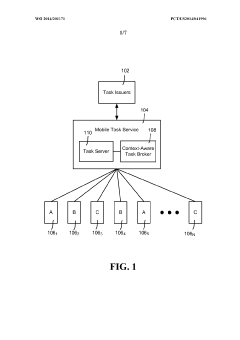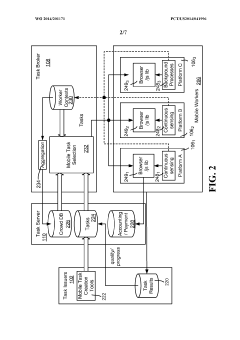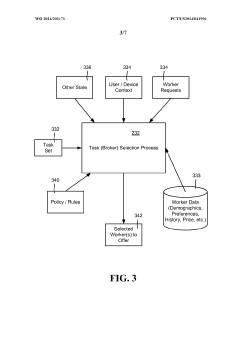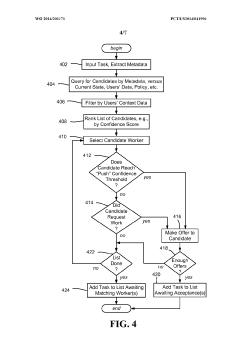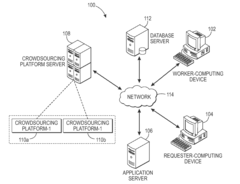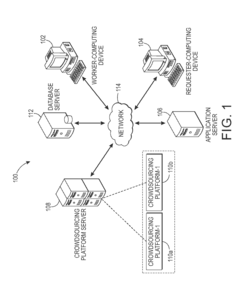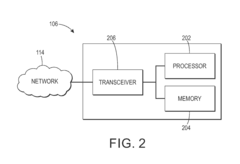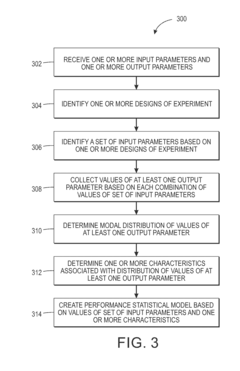Quantum Computing Techniques for Enhancing Crowdsourced Analytics
JUL 17, 20259 MIN READ
Generate Your Research Report Instantly with AI Agent
Patsnap Eureka helps you evaluate technical feasibility & market potential.
Quantum Computing Evolution and Objectives
Quantum computing has emerged as a revolutionary technology with the potential to transform various fields, including crowdsourced analytics. The evolution of quantum computing can be traced back to the early 1980s when Richard Feynman proposed the idea of using quantum mechanical systems for computation. Since then, the field has progressed rapidly, with significant milestones achieved in both theoretical and practical aspects.
The development of quantum computing has been driven by the limitations of classical computing in solving complex problems. As Moore's Law approaches its physical limits, quantum computing offers a promising alternative for tackling computationally intensive tasks. The field has seen remarkable advancements in recent years, with the creation of quantum processors containing increasing numbers of qubits and the demonstration of quantum supremacy by tech giants like Google and IBM.
In the context of crowdsourced analytics, quantum computing techniques hold immense potential for enhancing data processing capabilities and solving optimization problems. The primary objective of integrating quantum computing with crowdsourced analytics is to leverage the power of quantum algorithms to process and analyze vast amounts of data more efficiently than classical methods.
One of the key goals is to develop quantum algorithms that can handle the inherent complexity and diversity of crowdsourced data. This includes improving pattern recognition, clustering, and classification tasks, which are fundamental to extracting meaningful insights from large-scale, heterogeneous datasets. Quantum machine learning algorithms, in particular, show promise in accelerating these processes and uncovering hidden patterns that may be missed by classical approaches.
Another important objective is to address the scalability challenges associated with crowdsourced analytics. As the volume of data continues to grow exponentially, quantum computing techniques aim to provide solutions that can scale more effectively than classical methods. This includes developing quantum-inspired algorithms that can be implemented on near-term quantum devices, as well as hybrid quantum-classical approaches that combine the strengths of both paradigms.
Furthermore, the integration of quantum computing in crowdsourced analytics seeks to enhance the accuracy and reliability of results. By leveraging quantum phenomena such as superposition and entanglement, researchers aim to develop more robust statistical methods and improve the overall quality of insights derived from crowdsourced data. This is particularly crucial in domains where high-stakes decisions are made based on analytical outcomes, such as healthcare, finance, and scientific research.
As the field of quantum computing continues to evolve, the objectives for its application in crowdsourced analytics are likely to expand and refine. The ultimate goal is to create a symbiotic relationship between quantum computing and crowdsourced analytics, where the unique capabilities of quantum systems can be harnessed to unlock new possibilities in data analysis and decision-making processes.
The development of quantum computing has been driven by the limitations of classical computing in solving complex problems. As Moore's Law approaches its physical limits, quantum computing offers a promising alternative for tackling computationally intensive tasks. The field has seen remarkable advancements in recent years, with the creation of quantum processors containing increasing numbers of qubits and the demonstration of quantum supremacy by tech giants like Google and IBM.
In the context of crowdsourced analytics, quantum computing techniques hold immense potential for enhancing data processing capabilities and solving optimization problems. The primary objective of integrating quantum computing with crowdsourced analytics is to leverage the power of quantum algorithms to process and analyze vast amounts of data more efficiently than classical methods.
One of the key goals is to develop quantum algorithms that can handle the inherent complexity and diversity of crowdsourced data. This includes improving pattern recognition, clustering, and classification tasks, which are fundamental to extracting meaningful insights from large-scale, heterogeneous datasets. Quantum machine learning algorithms, in particular, show promise in accelerating these processes and uncovering hidden patterns that may be missed by classical approaches.
Another important objective is to address the scalability challenges associated with crowdsourced analytics. As the volume of data continues to grow exponentially, quantum computing techniques aim to provide solutions that can scale more effectively than classical methods. This includes developing quantum-inspired algorithms that can be implemented on near-term quantum devices, as well as hybrid quantum-classical approaches that combine the strengths of both paradigms.
Furthermore, the integration of quantum computing in crowdsourced analytics seeks to enhance the accuracy and reliability of results. By leveraging quantum phenomena such as superposition and entanglement, researchers aim to develop more robust statistical methods and improve the overall quality of insights derived from crowdsourced data. This is particularly crucial in domains where high-stakes decisions are made based on analytical outcomes, such as healthcare, finance, and scientific research.
As the field of quantum computing continues to evolve, the objectives for its application in crowdsourced analytics are likely to expand and refine. The ultimate goal is to create a symbiotic relationship between quantum computing and crowdsourced analytics, where the unique capabilities of quantum systems can be harnessed to unlock new possibilities in data analysis and decision-making processes.
Market Demand for Quantum-Enhanced Analytics
The market demand for quantum-enhanced analytics is experiencing significant growth as organizations across various sectors recognize the potential of quantum computing to revolutionize data analysis and decision-making processes. This emerging field combines the power of quantum computing with traditional analytics techniques to tackle complex problems that are currently intractable for classical computers.
In the financial sector, quantum-enhanced analytics is gaining traction for portfolio optimization, risk assessment, and fraud detection. Banks and investment firms are exploring quantum algorithms to analyze vast amounts of financial data more efficiently, potentially leading to better investment strategies and risk management. The insurance industry is also showing interest in leveraging quantum computing for more accurate actuarial modeling and claims processing.
Healthcare and pharmaceutical companies are increasingly looking to quantum-enhanced analytics for drug discovery and personalized medicine. The ability to simulate molecular interactions and analyze genomic data at unprecedented scales could dramatically accelerate the development of new treatments and improve patient outcomes. This has led to a surge in collaborations between quantum computing companies and major pharmaceutical firms.
In the realm of logistics and supply chain management, quantum-enhanced analytics promises to optimize routing, scheduling, and inventory management. As global supply chains become more complex, the demand for quantum solutions that can handle multi-variable optimization problems is growing. Major logistics companies and e-commerce giants are investing in quantum research to gain a competitive edge.
The energy sector is another area where quantum-enhanced analytics is gaining momentum. Oil and gas companies are exploring quantum algorithms for seismic data analysis and reservoir modeling, while renewable energy firms are looking to optimize grid management and energy distribution. The potential for quantum computing to accelerate materials science research is also driving interest in the development of more efficient solar cells and energy storage solutions.
Government agencies and research institutions are increasingly investing in quantum-enhanced analytics for climate modeling, weather prediction, and national security applications. The ability to process and analyze vast amounts of satellite and sensor data could lead to more accurate climate models and improved disaster response strategies.
As the demand for quantum-enhanced analytics grows, so does the need for skilled professionals who can bridge the gap between quantum physics and data science. Universities and tech companies are responding by developing quantum computing curricula and training programs to meet this emerging workforce demand.
While the market for quantum-enhanced analytics is still in its early stages, industry analysts project rapid growth in the coming years. As quantum hardware continues to advance and more practical applications are demonstrated, the demand for quantum-enhanced analytics solutions is expected to accelerate across multiple industries, driving innovation and creating new market opportunities.
In the financial sector, quantum-enhanced analytics is gaining traction for portfolio optimization, risk assessment, and fraud detection. Banks and investment firms are exploring quantum algorithms to analyze vast amounts of financial data more efficiently, potentially leading to better investment strategies and risk management. The insurance industry is also showing interest in leveraging quantum computing for more accurate actuarial modeling and claims processing.
Healthcare and pharmaceutical companies are increasingly looking to quantum-enhanced analytics for drug discovery and personalized medicine. The ability to simulate molecular interactions and analyze genomic data at unprecedented scales could dramatically accelerate the development of new treatments and improve patient outcomes. This has led to a surge in collaborations between quantum computing companies and major pharmaceutical firms.
In the realm of logistics and supply chain management, quantum-enhanced analytics promises to optimize routing, scheduling, and inventory management. As global supply chains become more complex, the demand for quantum solutions that can handle multi-variable optimization problems is growing. Major logistics companies and e-commerce giants are investing in quantum research to gain a competitive edge.
The energy sector is another area where quantum-enhanced analytics is gaining momentum. Oil and gas companies are exploring quantum algorithms for seismic data analysis and reservoir modeling, while renewable energy firms are looking to optimize grid management and energy distribution. The potential for quantum computing to accelerate materials science research is also driving interest in the development of more efficient solar cells and energy storage solutions.
Government agencies and research institutions are increasingly investing in quantum-enhanced analytics for climate modeling, weather prediction, and national security applications. The ability to process and analyze vast amounts of satellite and sensor data could lead to more accurate climate models and improved disaster response strategies.
As the demand for quantum-enhanced analytics grows, so does the need for skilled professionals who can bridge the gap between quantum physics and data science. Universities and tech companies are responding by developing quantum computing curricula and training programs to meet this emerging workforce demand.
While the market for quantum-enhanced analytics is still in its early stages, industry analysts project rapid growth in the coming years. As quantum hardware continues to advance and more practical applications are demonstrated, the demand for quantum-enhanced analytics solutions is expected to accelerate across multiple industries, driving innovation and creating new market opportunities.
Quantum Computing Challenges in Crowdsourcing
Quantum computing presents several significant challenges when applied to crowdsourced analytics. One of the primary obstacles is the limited availability of quantum hardware. Despite rapid advancements in quantum technology, the number of quantum computers with sufficient qubits and coherence times to handle complex crowdsourced data analysis remains scarce. This scarcity restricts widespread adoption and experimentation in real-world crowdsourcing scenarios.
Another major challenge lies in the quantum-classical interface. Crowdsourced data is typically collected and stored in classical formats, necessitating efficient methods for data conversion and transfer between classical and quantum systems. This process can introduce latency and potential loss of information, impacting the overall efficiency of quantum-enhanced analytics.
The inherent noise and error rates in current quantum systems pose a significant hurdle for crowdsourced analytics. Quantum algorithms must be designed to be fault-tolerant and capable of operating in the presence of noise, which is particularly challenging when dealing with large-scale, diverse datasets typical in crowdsourcing applications.
Scalability remains a critical issue. While quantum computing shows promise for certain types of problems, scaling quantum algorithms to handle the massive volumes of data often encountered in crowdsourcing projects is not straightforward. Developing quantum algorithms that can efficiently process and analyze large-scale crowdsourced datasets without losing the quantum advantage is an ongoing research challenge.
The complexity of quantum algorithms presents another barrier. Many quantum algorithms require deep expertise in quantum mechanics and computer science to implement and optimize. This complexity makes it difficult for crowdsourcing platforms and data scientists to integrate quantum techniques into their existing workflows without significant specialized knowledge.
Data privacy and security concerns are amplified in the quantum realm. Quantum computing's potential to break certain encryption methods raises questions about data protection in crowdsourced projects, especially those dealing with sensitive information. Developing quantum-safe encryption methods for crowdsourced data is crucial but technically challenging.
Lastly, the cost associated with quantum computing resources is a significant obstacle. The high expenses related to quantum hardware acquisition, maintenance, and operation may limit access to quantum-enhanced analytics for many crowdsourcing initiatives, particularly those with limited budgets or in developing regions.
Addressing these challenges requires interdisciplinary collaboration between quantum physicists, computer scientists, and crowdsourcing experts to develop practical, scalable, and secure quantum computing techniques for enhancing crowdsourced analytics.
Another major challenge lies in the quantum-classical interface. Crowdsourced data is typically collected and stored in classical formats, necessitating efficient methods for data conversion and transfer between classical and quantum systems. This process can introduce latency and potential loss of information, impacting the overall efficiency of quantum-enhanced analytics.
The inherent noise and error rates in current quantum systems pose a significant hurdle for crowdsourced analytics. Quantum algorithms must be designed to be fault-tolerant and capable of operating in the presence of noise, which is particularly challenging when dealing with large-scale, diverse datasets typical in crowdsourcing applications.
Scalability remains a critical issue. While quantum computing shows promise for certain types of problems, scaling quantum algorithms to handle the massive volumes of data often encountered in crowdsourcing projects is not straightforward. Developing quantum algorithms that can efficiently process and analyze large-scale crowdsourced datasets without losing the quantum advantage is an ongoing research challenge.
The complexity of quantum algorithms presents another barrier. Many quantum algorithms require deep expertise in quantum mechanics and computer science to implement and optimize. This complexity makes it difficult for crowdsourcing platforms and data scientists to integrate quantum techniques into their existing workflows without significant specialized knowledge.
Data privacy and security concerns are amplified in the quantum realm. Quantum computing's potential to break certain encryption methods raises questions about data protection in crowdsourced projects, especially those dealing with sensitive information. Developing quantum-safe encryption methods for crowdsourced data is crucial but technically challenging.
Lastly, the cost associated with quantum computing resources is a significant obstacle. The high expenses related to quantum hardware acquisition, maintenance, and operation may limit access to quantum-enhanced analytics for many crowdsourcing initiatives, particularly those with limited budgets or in developing regions.
Addressing these challenges requires interdisciplinary collaboration between quantum physicists, computer scientists, and crowdsourcing experts to develop practical, scalable, and secure quantum computing techniques for enhancing crowdsourced analytics.
Current Quantum Algorithms for Crowdsourcing
01 Quantum Error Correction and Fault Tolerance
Techniques for improving the reliability and stability of quantum computations by implementing error correction codes and fault-tolerant protocols. These methods help mitigate the effects of decoherence and noise in quantum systems, enabling longer coherence times and more accurate quantum operations.- Quantum Error Correction and Fault Tolerance: Techniques for improving the reliability and stability of quantum computations by implementing error correction codes and fault-tolerant protocols. These methods help mitigate the effects of decoherence and noise in quantum systems, enabling longer coherence times and more accurate quantum operations.
- Quantum Algorithm Optimization: Development of advanced quantum algorithms and optimization techniques to enhance the performance and efficiency of quantum computations. This includes improving existing algorithms and creating new ones tailored for specific quantum hardware architectures.
- Quantum-Classical Hybrid Computing: Integration of quantum and classical computing systems to leverage the strengths of both paradigms. This approach combines quantum processors with classical computers to solve complex problems more efficiently than either system alone.
- Quantum Hardware Advancements: Innovations in quantum hardware design and fabrication, including improvements in qubit quality, coherence times, and scalability. This encompasses advancements in various quantum computing platforms such as superconducting circuits, trapped ions, and topological qubits.
- Quantum Machine Learning and AI: Application of quantum computing techniques to enhance machine learning and artificial intelligence algorithms. This includes developing quantum versions of classical machine learning models and exploring new paradigms for AI enabled by quantum systems.
02 Quantum Algorithm Optimization
Development of advanced quantum algorithms and optimization techniques to enhance the performance and efficiency of quantum computations. This includes improving existing algorithms and creating new ones tailored for specific quantum hardware architectures and problem domains.Expand Specific Solutions03 Quantum-Classical Hybrid Computing
Integration of quantum and classical computing systems to leverage the strengths of both paradigms. This approach combines quantum processors with classical computers to optimize resource allocation, improve overall system performance, and solve complex problems more efficiently.Expand Specific Solutions04 Quantum Hardware Advancements
Innovations in quantum hardware design and fabrication, including improvements in qubit quality, coherence times, and scalability. This encompasses advancements in various quantum computing platforms such as superconducting circuits, trapped ions, and topological qubits.Expand Specific Solutions05 Quantum Machine Learning and AI Integration
Exploration of quantum-enhanced machine learning algorithms and the integration of quantum computing with artificial intelligence. This includes developing quantum neural networks, quantum support vector machines, and other quantum-inspired AI techniques to solve complex problems in various domains.Expand Specific Solutions
Key Players in Quantum Analytics
The quantum computing techniques for enhancing crowdsourced analytics market is in its early stages, characterized by rapid technological advancements and growing interest from both academia and industry. The market size is expanding, driven by increasing demand for more efficient data processing and analysis in various sectors. While still nascent, the technology is maturing, with companies like IBM, Google, and Microsoft leading the charge. Universities such as Zhejiang University and Beihang University are contributing significant research. Startups like Qomplx and 1QB Information Technologies are also making strides in developing quantum-enhanced analytics solutions, indicating a competitive and dynamic landscape poised for substantial growth in the coming years.
1QB Information Technologies, Inc.
Technical Solution: 1QBit specializes in quantum software and quantum-inspired algorithms for various industries, including finance and healthcare. Their approach to enhancing crowdsourced analytics involves developing quantum and quantum-inspired algorithms for optimization, machine learning, and data analysis. They have created a platform called 1QBit QEMIST, which uses quantum computing techniques to solve complex chemistry problems, potentially applicable to analyzing crowdsourced molecular data[9]. 1QBit also focuses on developing hybrid quantum-classical algorithms that can leverage both quantum and classical computing resources for data analysis tasks[10].
Strengths: Specialized in quantum software and algorithms, industry-specific solutions, focus on near-term quantum applications. Weaknesses: Reliance on hardware provided by other companies, limited public information on specific crowdsourced analytics applications.
Microsoft Technology Licensing LLC
Technical Solution: Microsoft's approach to quantum computing for crowdsourced analytics focuses on topological qubits, which are theoretically more stable and less prone to errors. They are developing a full-stack quantum computing system, including hardware, software, and cloud services. For crowdsourced analytics, Microsoft is exploring quantum-inspired algorithms that can run on classical hardware but leverage quantum principles to solve complex optimization problems[7]. Their Azure Quantum service provides access to quantum hardware and simulators, allowing researchers to experiment with quantum algorithms for data analysis. Microsoft is also developing Q#, a quantum programming language, and quantum development kit to facilitate the creation of quantum applications for crowdsourced analytics[8].
Strengths: Focus on more stable topological qubits, comprehensive quantum development ecosystem, integration with Azure cloud services. Weaknesses: Topological qubit technology still in early stages, limited hardware availability compared to competitors.
Quantum Entanglement in Distributed Computing
Context-aware mobile crowdsourcing
PatentWO2014201171A2
Innovation
- A context-aware mobile crowdsourcing system that utilizes sensor data from mobile devices to match tasks with workers based on context-related criteria such as location, availability, and device sensors, enabling cross-platform task execution and improved task quality.
Methods and systems for modeling crowdsourcing platform
PatentActiveUS20150278403A1
Innovation
- A method and system for creating a performance statistical model that collects and analyzes output parameters for each combination of input parameters, using design of experiments or historical data, to determine their distribution and characteristics, enabling the creation of a model that predicts the relationship between input parameters and output performance.
Quantum Error Correction in Crowdsourced Data
Quantum error correction plays a crucial role in enhancing the reliability and accuracy of crowdsourced data analytics when leveraging quantum computing techniques. As quantum systems are inherently susceptible to environmental noise and decoherence, implementing robust error correction mechanisms is essential for maintaining the integrity of quantum information throughout the computation process.
In the context of crowdsourced analytics, quantum error correction addresses the challenges posed by the distributed nature of data collection and processing. The quantum states used to encode crowdsourced information are particularly vulnerable to errors during transmission and manipulation. By employing quantum error correction codes, such as surface codes or topological codes, it becomes possible to detect and correct errors without compromising the underlying quantum information.
One of the primary approaches to quantum error correction in crowdsourced data involves the use of redundancy. This technique entails encoding logical qubits across multiple physical qubits, creating a fault-tolerant system that can withstand individual qubit errors. The redundancy allows for the detection and correction of errors through syndrome measurements, which identify deviations from the expected quantum state without directly measuring the encoded information.
Another key aspect of quantum error correction in crowdsourced analytics is the implementation of continuous error correction protocols. These protocols actively monitor the quantum system and apply corrective operations in real-time, mitigating the accumulation of errors during extended computation periods. This is particularly important for crowdsourced data analysis, where large volumes of information may need to be processed over extended periods.
The integration of machine learning algorithms with quantum error correction techniques has shown promising results in improving the efficiency and effectiveness of error mitigation in crowdsourced quantum systems. By training neural networks to recognize error patterns and predict optimal correction strategies, it becomes possible to adapt the error correction protocols dynamically based on the specific characteristics of the crowdsourced data and the quantum hardware being used.
Furthermore, the development of hardware-aware quantum error correction schemes has emerged as a critical area of research. These schemes take into account the specific noise profiles and physical constraints of the quantum devices used in crowdsourced analytics, allowing for tailored error correction strategies that maximize the fidelity of quantum computations while minimizing resource overhead.
As quantum computing techniques continue to advance, the field of quantum error correction for crowdsourced analytics is likely to see further innovations. These may include the development of more efficient encoding schemes, improved error detection algorithms, and novel approaches to fault-tolerant quantum computation that can scale to larger and more complex crowdsourced data analysis tasks.
In the context of crowdsourced analytics, quantum error correction addresses the challenges posed by the distributed nature of data collection and processing. The quantum states used to encode crowdsourced information are particularly vulnerable to errors during transmission and manipulation. By employing quantum error correction codes, such as surface codes or topological codes, it becomes possible to detect and correct errors without compromising the underlying quantum information.
One of the primary approaches to quantum error correction in crowdsourced data involves the use of redundancy. This technique entails encoding logical qubits across multiple physical qubits, creating a fault-tolerant system that can withstand individual qubit errors. The redundancy allows for the detection and correction of errors through syndrome measurements, which identify deviations from the expected quantum state without directly measuring the encoded information.
Another key aspect of quantum error correction in crowdsourced analytics is the implementation of continuous error correction protocols. These protocols actively monitor the quantum system and apply corrective operations in real-time, mitigating the accumulation of errors during extended computation periods. This is particularly important for crowdsourced data analysis, where large volumes of information may need to be processed over extended periods.
The integration of machine learning algorithms with quantum error correction techniques has shown promising results in improving the efficiency and effectiveness of error mitigation in crowdsourced quantum systems. By training neural networks to recognize error patterns and predict optimal correction strategies, it becomes possible to adapt the error correction protocols dynamically based on the specific characteristics of the crowdsourced data and the quantum hardware being used.
Furthermore, the development of hardware-aware quantum error correction schemes has emerged as a critical area of research. These schemes take into account the specific noise profiles and physical constraints of the quantum devices used in crowdsourced analytics, allowing for tailored error correction strategies that maximize the fidelity of quantum computations while minimizing resource overhead.
As quantum computing techniques continue to advance, the field of quantum error correction for crowdsourced analytics is likely to see further innovations. These may include the development of more efficient encoding schemes, improved error detection algorithms, and novel approaches to fault-tolerant quantum computation that can scale to larger and more complex crowdsourced data analysis tasks.
Ethical Implications of Quantum Crowdsourcing
The integration of quantum computing techniques with crowdsourced analytics raises significant ethical considerations that must be carefully addressed. As quantum systems enhance the processing power and capabilities of crowdsourced data analysis, the potential for both positive and negative societal impacts increases dramatically. One primary concern is the protection of individual privacy within quantum-enhanced crowdsourcing platforms. The ability of quantum algorithms to process vast amounts of data at unprecedented speeds may lead to unintended breaches of personal information or the identification of individuals from seemingly anonymized datasets.
Furthermore, the increased accuracy and predictive power of quantum-enhanced analytics could exacerbate existing biases and inequalities if not properly managed. There is a risk that the results of such powerful analytical tools could be used to discriminate against certain groups or manipulate public opinion on a massive scale. The ethical use of these technologies requires robust safeguards and transparent governance structures to ensure that the benefits are distributed equitably and potential harms are mitigated.
Another critical ethical consideration is the potential for quantum crowdsourcing to widen the technological divide between those with access to quantum resources and those without. As quantum computing remains a highly specialized and resource-intensive field, there is a risk of creating a new form of digital inequality, where only a select few organizations or nations can harness the full potential of quantum-enhanced crowdsourced analytics.
The ethical implications extend to the realm of cybersecurity and national security. Quantum computing's potential to break current encryption methods poses significant risks to data security in crowdsourcing platforms. Ensuring the integrity and confidentiality of crowdsourced data in a post-quantum world will require new ethical frameworks and security protocols.
Moreover, the ethical use of quantum crowdsourcing in scientific research and development must be carefully considered. While the technology offers unprecedented opportunities for collaborative problem-solving and innovation, it also raises questions about intellectual property rights, attribution of discoveries, and the fair distribution of benefits derived from quantum-enhanced crowdsourced efforts.
Lastly, the environmental impact of quantum computing infrastructure necessary for large-scale crowdsourced analytics must be evaluated from an ethical standpoint. The energy consumption and resource requirements of quantum systems could contribute to environmental challenges, necessitating a balanced approach that weighs the societal benefits against ecological costs.
Furthermore, the increased accuracy and predictive power of quantum-enhanced analytics could exacerbate existing biases and inequalities if not properly managed. There is a risk that the results of such powerful analytical tools could be used to discriminate against certain groups or manipulate public opinion on a massive scale. The ethical use of these technologies requires robust safeguards and transparent governance structures to ensure that the benefits are distributed equitably and potential harms are mitigated.
Another critical ethical consideration is the potential for quantum crowdsourcing to widen the technological divide between those with access to quantum resources and those without. As quantum computing remains a highly specialized and resource-intensive field, there is a risk of creating a new form of digital inequality, where only a select few organizations or nations can harness the full potential of quantum-enhanced crowdsourced analytics.
The ethical implications extend to the realm of cybersecurity and national security. Quantum computing's potential to break current encryption methods poses significant risks to data security in crowdsourcing platforms. Ensuring the integrity and confidentiality of crowdsourced data in a post-quantum world will require new ethical frameworks and security protocols.
Moreover, the ethical use of quantum crowdsourcing in scientific research and development must be carefully considered. While the technology offers unprecedented opportunities for collaborative problem-solving and innovation, it also raises questions about intellectual property rights, attribution of discoveries, and the fair distribution of benefits derived from quantum-enhanced crowdsourced efforts.
Lastly, the environmental impact of quantum computing infrastructure necessary for large-scale crowdsourced analytics must be evaluated from an ethical standpoint. The energy consumption and resource requirements of quantum systems could contribute to environmental challenges, necessitating a balanced approach that weighs the societal benefits against ecological costs.
Unlock deeper insights with Patsnap Eureka Quick Research — get a full tech report to explore trends and direct your research. Try now!
Generate Your Research Report Instantly with AI Agent
Supercharge your innovation with Patsnap Eureka AI Agent Platform!
